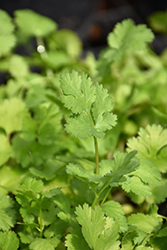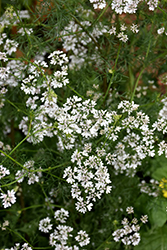Height: 24 inches
Spread: 18 inches
Sunlight:
![]()
![]()
Hardiness Zone: (annual)
Other Names: Coriander, Chinese Parsley, Dhania
Description:
Commonly grown in herb gardens for its strong scented foliage and aromatic seeds; remove flower heads to prolong harvest of leaves; dislikes hot summers and humidity
Edible Qualities
Cilantro is an annual herb that is typically grown for its edible qualities. The fragrant ferny pinnately compound green leaves are usually harvested from early to late summer. The leaves have a savory taste.
The leaves are most often used in the following ways:
- Fresh Eating
- Cooking
- Seasoning
- Sauces
Planting & Growing
Cilantro will grow to be about 20 inches tall at maturity, with a spread of 18 inches. Its foliage tends to remain dense right to the ground, not requiring facer plants in front. This fast-growing annual will normally live for one full growing season, needing replacement the following year.
This plant is typically grown in a designated herb garden. It does best in full sun to partial shade. It does best in average to evenly moist conditions, but will not tolerate standing water. It is not particular as to soil pH, but grows best in rich soils. It is somewhat tolerant of urban pollution. This species is not originally from North America.
Cilantro is a good choice for the edible garden, but it is also well-suited for use in outdoor pots and containers. It can be used either as 'filler' or as a 'thriller' in the 'spiller-thriller-filler' container combination, depending on the height and form of the other plants used in the container planting. Note that when growing plants in outdoor containers and baskets, they may require more frequent waterings than they would in the yard or garden.
Disclaimer - This resource is provided for informational purposes only and does NOT reflect current availability. Inventory varies seasonally, so we cannot guarantee that every plant will be in stock at all times - please contact your favourite GardenWorks location directly for current availability. It does not include our entire inventory of plants, so be sure to visit GardenWorks to see varieties that may not be represented on this list.


